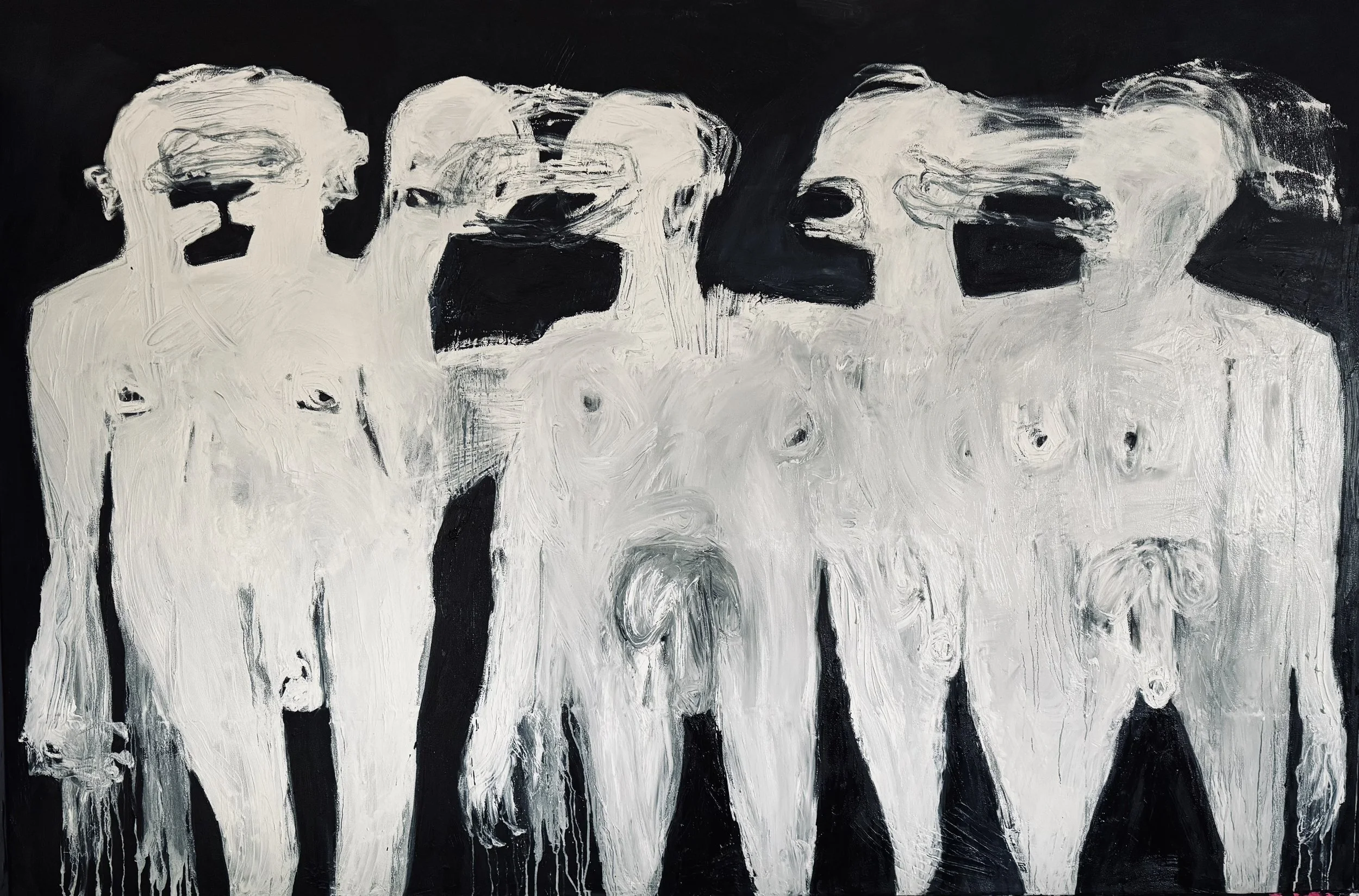Trude Gunther, 3 112 023 moments of mad ,2023
Trude Gunther, 1 percent rabbit, 2023
Trude Gunther, 4 110 2023 storie of us untold,2023
Trude Gunther, 2x5 110 white privileged flesh in suits,2023
Trude Gunther, 10 x 112023 girls’ desire the same, 2023
An apologetic remorse code
by Trude Gunther
24.11.23 - 11.01.24
“Three short taps followed by three long taps, and then three short taps again”. That’s the well-known SOS Morse Code for distress in an emergency. When signalling for help, one can either tap a surface like a table, or simply follow the sequence of taps by flicking a light switch in the same order to attract attention.
An Apologetic Remorse Code is Trude Gunther’s first solo exhibition with Cape Town’s AVA (Association for Visual Arts) Gallery and features some of her arresting large-scale artworks as raging symbols against the machinations of banal civility. When referencing the title, the artist muses on Plato’s Apology, where Socrates recites, “And I said to myself, Go I must to all who appear to know, and find out the meaning of the oracle. And I swear to you, Athenians, for I must tell you the truth -- the result of my mission was just this: I found that the men most in repute were all but the most foolish; and that others less esteemed were really wiser and better.” Socrates was right but unfortunately ahead of his time in his assertion that the wise man who knows a lot understands that he knows nothing at all.
Plato’s title is an intellectual quagmire as it infers Socrates is publicly apologising for ‘leading the youth of Athens astray’ during his prosecution. However, Socrates’ soliloquy is true to its Latin origin of ‘apologia’ , which means ‘to defend or justify’. The philosopher argues that an individual truth does not, so to speak, a universal truth maketh. That is to say, we can experience the exact same moment collectively and have separate realities and different accounts of what happened. The injured and the perpetrator looking at the shrapnel from an altercation and disagreeing on who’s responsible for the explosion. And so, if the body of the injured signals ‘three short taps followed by three long taps, and then three short taps again’ to say it’s in distress, then the perpetrator has two options: to double down and vehemently defend their position, or be remorseful and apologise. Simply put, “An Apologetic Remorse Code is about coding forgiveness,” says Gunther.
In her practice the artist has real life models sit for her as her preferred painting method is the not-sogallery friendly ink and paper, which she had to augment for this exhibit. Using both a female and male model, Gunther distorts the three-dimensional view of the anatomy and plunges it into the surreal, where inanimate objects seem to morph into beings and beings morph into each other. From the phallic to the poetically absurd, the artist interrogates our relationship with our connectedness and the deference to ‘the other’. This distortion presents a challenge in discerning rage from anguish in her subjects.
In our afflicted and often navel gazing existence, everyone is ‘othered’; women for being too emotional and men for being objects of power. If then, forgiveness is about giving up the desire or power to punish, remorse has to be the only antidote left to connect us. Renouncing retribution is about repair, and you cannot remove ‘pair’ from repair. It is irrefutable then to conclude that repairing is a collaboration. Through An Apologetic Remorse Code, Gunther presents an opportunity for the viewer to engage with the narrative of forgiveness without conflating it with religion or piousness. Her figures are screaming for an apology while also exploding with fury. The artist attributes neither to the feminine nor the masculine - we do, after all, possess this duality within our beings. But instead asks, can hostility metamorphosize into love? Can violent anger mutate to purgation?
Gunther artfully signals towards apologies unheard, points at doors to closure left ajar and toxic kindness as the guillotine that severs all ties to real connection. Her artistic subjects may be abstracted but the truth of her (re)morse code is undeniable… When in distress remember to signal, three short taps followed by three long taps, and then three short taps again. - by Lerato Tshabalala
Trude Gunther (1981-) Lives and work from her home in Stellenbosch. She holds degrees in Drama, a Fine Arts with distinction and Honours in Visual Arts Illustration cum laude. Most recent participation in exhibitions include SASOL New Signatures 2019, an artist residency at Chateau Orqevaux in France (2020), Woordfees Artist Week 2021, "Together" at AVA (2022), Sessions (2022), TAF Paper Pop-up (2023), Woordfees Atelier exhibition as ISArt (2023).
Trude Gunther, 7 x 11 x 2023 degrees of hurt,2023
Trude Gunther, 2 pieces in chair, 2023







